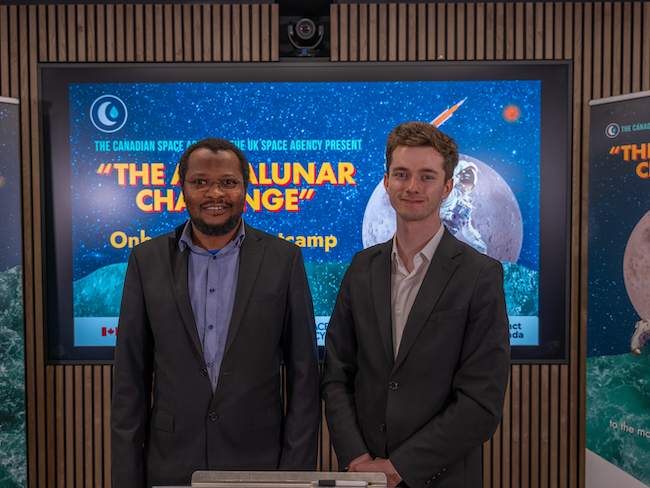UofG chemists shoot for the moon as Aqualunar Challenge finalists
Published: 24 July 2024
A team from the School of Chemistry have been announced as finalists in the Aqualunar Challenge.
A team from the University of Glasgow’s School of Chemistry have been announced as finalists in the Aqualunar Challenge.
Lunasonic, led by Shaun Fletcher and Dr Lukman Yusuf, are one of 10 teams competing to develop new technologies that could provide a reliable supply of water to a permanent crewed base on the Moon by purifying ice frozen in the lunar soil.

The team have been awarded £30,000 to develop their technology, which aims to use the power of ultrasound to process and purify lunar ice.
Dirty ice collected from the moon’s surface would be melted, and large soil particles removed. Following this initial treatment, the water is pumped into a ‘sonoreactor’ which uses ultrasound to split and remove volatile compounds and gases, destroy pollutants and cause lunar dust to clump together for easy removal.
The system would then pass the water through a filter bed of lunar soil, which is rich in calcium, magnesium and aluminium oxide, to remove final contaminants – similar to how a household water filter works.
The Lunasonic team are part of the School of Chemistry’s Symes Group, led by Professor Mark Symes.
Dr Yusuf said: “We’re thrilled to have been chosen as finalists in the Aqualunar Challenge, which gives us the opportunity to develop some potentially transformative technology. Lunasonic builds on existing research at the Symes Group looking at ways to process lunar regolith to provide sources of water, and we’re looking forward to further developing our sonoreactor technology with the funding from the challenge.”
Mr Fletcher said: “While the Lunasonic project could help future space missions easily access clean drinking water, it could also make a difference much closer to home. Ultrasonic treatment has been shown to be effective at removing emerging pollutants on Earth, including medicines and dyes, which existing wastewater treatment plants are not always equipped to deal with. Deploying our system in remote regions, or other locations without robust water infrastructure, could provide improved water quality for local people.”
The Aqualunar Challenge is part of a £1.2m international prize funded by the UK Space Agency’s International Bilateral Fund and delivered by Challenge Works – experts in designing and running innovation challenge prizes. The challenge is a collaboration with the Canadian Space Agency (CSA) and Impact Canada.
Around the lunar south pole, it’s estimated that 6.5% of the soil (regolith) is water frozen as ice. For a permanent crewed base on the moon to be possible, astronauts will need a reliable supply of water for drinking and growing food, as well as oxygen for air and hydrogen for fuel.
If the lunar ice can be successfully extracted, separated from the soil and purified, it makes NASA’s goal of establishing a base by the end of the decade viable. The Artemis campaign, as it is known, is supported by the UK Space Agency through its membership of the European Space Agency.
Paul Bate, CEO, UK Space Agency, said: “The ambition to build a sustainable human presence on the Moon through the NASA-led Artemis Missions will only succeed if we have ways of generating a reliable supply of clean water. The Aqualunar Challenge showcases a range of innovative ideas from UK teams and individuals to tackle this challenge, while strengthening ties with our Canadian partners.”
Explaining the importance of these new technologies, UK Space Agency reserve astronaut and chair of the Aqualunar Challenge judging panel, Meganne Christian, said: “To sustain a permanent crewed base on the Moon over years and decades, astronauts will need a reliable water supply, which we can also use to produce oxygen and hydrogen. It is expensive and risky to send a continuous convoy of rockets from Earth to the Moon to keep a base supplied, which is why we need to develop the technologies that can purify the water that is already on the Moon.”
Lunasonic will develop their sonoreactor technology between now and early 2025, before final judging. In addition to £30,000 in funding, the team will also receive a comprehensive programme of non-financial expert support, mentoring and events from Challenge Works and the UK Space Agency worth a similar value. The Aqualunar Challenge will name one winner and two runners up in Spring 2025, sharing an additional £300,000 to advance their technologies to the next level.
First published: 24 July 2024
<< July

